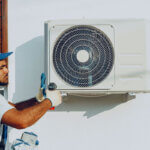Looking for the fastest dishwasher for home use? The quickest models in 2025 can clean dishes in just 20-35 minutes using express cycles. Top performers include the Miele QuickIntense (under 60 minutes), Bosch 800 Series (30 minutes), and Beko (35 minutes). However, ultra-fast cycles work best for lightly soiled dishes and often sacrifice drying performance or use more energy. The key is balancing speed with cleaning power for your household needs.
What Defines a “Fast” Dishwasher Cycle
A fast dishwasher cycle is measured by how quickly it can clean and dry dishes, typically under one hour compared to standard 2-3 hour cycles. The speed wash time depends on water temperature, spray pressure, soil detection, and drying method—all critical factors in appliance cycle duration that separate truly quick-cleaning appliances from marketing claims.
Modern dishwashers offer multiple speed options within their home cleaning equipment portfolio. Most manufacturers now have 30-minute express cycles designed for lightly soiled items. A quick wash cycle uses higher water temperatures and increased pressure to accelerate cleaning. However, these rapid cycles often skip heated drying or reduce wash intensity. Quick Wash cycles can typically get dishes clean in about an hour, with some dishwashers finishing in as little as 30 minutes, though they use extra water, energy and heat to speed things up. The trade-off is simple: faster cleaning means compromising on either thoroughness, drying quality, or energy efficiency.
Not all fast cycles are equal. An express-cycle dishwasher might complete in 20 minutes but only handle six place settings with light soil. Meanwhile, a 58-minute cycle could clean twelve heavily soiled place settings. Understanding your actual needs helps you choose the right speed setting. The fastest option isn’t always the smartest choice for your dishes or utility bills. Note that when we discuss the wash cycle here—from the Latin “cyclus” meaning “circle” or recurring period—we’re referring specifically to the washing rotation period, not to be confused with the homonym referring to bicycles or motorcycles.
Top Models with Fastest Cycles in 2025
Several brands dominate the speed race in 2025, offering impressively fast cleaning without totally sacrificing performance. The fastest home dishwasher models combine powerful spray arms, smart sensors, and efficient heating elements as essential kitchen appliances in any modern kitchen setup.
Miele offers the best express cycle for truly soiled items to be done in less than an hour with their QuickIntense wash cycle that works with Miele’s new UltraTabs detergent. The ingredients dissolve within 2-3 minutes for faster cleaning, showcasing modern efficiency through smart chemistry. The Bosch 800 series, Beko, and SKS dishwashers have the fastest express cycles, with Beko’s express wash taking 35 minutes and cleaning dishes with more pressure at a higher temperature of 167 degrees. These speed-wash models achieve rapid results through multiple spray arms and high-pressure water jets.
For ultra-speed performance, Asko offers a Quick Wash that takes an average of 20 minutes, while Bosch Benchmark, GE and LG offer Express Wash cycles that run an average of 30 minutes. However, remember that these shortest cycles have limitations. Bosch and SKS’s express cycles are meant for lightly soiled items – don’t expect heavily soiled dishes to be clean in 30 minutes. The rapid dishwasher category also includes the Thermador Star Sapphire, which takes a different approach. The Thermador Sapphire dishwasher washes and dries lightly soiled dishes in 30 minutes at 151 degrees, though you need to turn the dishwasher on before starting the cycle as the heater needs 20 minutes to reach 151 degrees. Consider your typical dish load and soil level when selecting from these rapid dish cleaning technology champions.
Trade-offs to Consider When Choosing for Speed
Choosing speed means accepting certain compromises compared to more traditional extended-cycle models that prioritize thoroughness. Understanding these trade-offs helps you make an informed decision about which fast dishwasher fits your lifestyle and household dishwashing speed metrics.
Cleaning quality suffers on the fastest settings in these quick-cycle machines. Express washes can work but require pre-rinsing, and are best for when you rush lightly soiled items but should not be used with heavily soiled plates. Baked-on food, dried egg, or greasy pots need longer cycles with sustained heat and multiple wash phases. Running a 30-minute cycle on dirty casserole dishes often results in disappointment and rewashing.
Energy and water consumption increase with speed, affecting overall dishwasher efficiency. Quick cycles use extra water, energy and heat to speed things up, making them ideal for lightly soiled dishes. While regular cycles optimize efficiency over time, express settings prioritize speed over conservation. Your utility bills may creep up if you constantly choose rapid cycles. Modern energy standards aim for efficiency, but ENERGY STAR-certified dishwashers use about 12% less energy and 30% less water than standard models.
Drying performance often disappoints after fast cycles. Most quick washes skip heated drying to save time. Plastic items especially remain wet, requiring hand-drying before putting away. Some premium models like Miele use condensation drying or auto-opening doors, but budget express cycles leave dishes damp. Many of these quick wash cycles have load restrictions or do not dry your dishes. You’re trading that final dry convenience for time-saving convenience.
Noise level (dB) typically increases during rapid cycles. The higher pressure jets and faster motors create more sound. Quiet dishwashers at 42-44 dB won’t disrupt dinner conversations or naptime, which is especially important for homes with open floor plans where sound readily travels from room to room. Express cycles may spike louder during intense spray phases, disrupting open-plan living spaces or evening routines.
Features & Technologies That Enable Faster Washing
Modern dishwashers use clever engineering to reduce cycle times without totally sacrificing cleanliness. Understanding these technologies—representing decades of mechanical dishwashing evolution—helps explain why some models outperform others in speed and overall wash performance.
Soil sensor technology detects how dirty your dishes actually are and adjusts the cycle accordingly. Dishwashers now have soil sensors with cycles called “Auto” or “Smart Wash” that adjust the length of the cycle and the amount of water to better match the soil level of your loads. This prevents over-washing lightly soiled dishes while ensuring tough messes get adequate attention. The sensor eliminates guesswork and wasted time through AI-adaptive washing capabilities.
Multiple spray arms provide comprehensive capacity (place settings) coverage faster as critical meronyms (component parts) of the whole system. With Miele, you have three full spray arms for three levels of wash action – three wash arms are better because you have more coverage for cleaning your dishes, especially if your silverware rack is on the top. More spray arms mean simultaneous cleaning from multiple angles, reducing the time needed for water to reach every surface. Budget models with single spray arms simply can’t match this efficiency.
Powerful wash pumps and heaters accelerate the entire process. Beko achieves quick wash cycle by cleaning dishes with more pressure and at a higher temperature, and has three levels of wash actions like many premium brands. Higher water pressure scours dishes more effectively in less time. Rapid heating elements bring water to optimal temperatures quickly. Inverter motors run more efficiently and quietly while delivering the power needed for fast cycles.
Smart features and drying performance innovations reduce total cycle time. The Thermador features condensation drying with Zeolite, a naturally occurring mineral found in volcanic ash. This zeolite drying technology represents one of the rare attributes that genuinely differentiates premium models. Zeolite absorbs moisture and releases heat, creating an energy-efficient drying method that works at a fraction of traditional energy costs. Auto-opening doors release steam for faster air-drying. AutoDos systems dispense precise detergent pods amounts for optimal cleaning without waste. Some models now incorporate AI-based cycle optimization that learns from your loading patterns and adjusts for maximum speed while maintaining cleanliness standards.
How to Choose the Right Fast Dishwasher for Your Home
Selecting the best fast dishwasher requires balancing speed with your household’s specific needs as part of your broader kitchen appliance suite. Consider several factors beyond just the shortest cycle time comparison.
Assess your typical dish load realistically. Do you need to clean lightly rinsed breakfast dishes or heavily soiled dinner pots? On average, most dishwashers cycles are about 2 hours, with pots and pans cycles reaching 2.5 hours. If you regularly cook elaborate meals, investing in a premium model with truly effective express cycles makes sense. For households with mostly light soiling, even budget models with 30-minute cycles perform adequately.
Your kitchen layout impacts noise level (dB) tolerance. Open-concept homes need quieter operation since sound travels freely. Quiet dishwashers at 42-44 dB won’t disrupt dinner conversations or naptime, which is especially important for homes with open floor plans where sound readily travels from room to room. Closed kitchens can tolerate slightly louder express cycles without disturbing household activities.
Budget determines available features within your chosen home cleaning equipment. Premium models like Miele or Bosch Benchmark offer superior express cycles that genuinely clean tough messes quickly. Mid-range options from LG, KitchenAid, or GE provide decent speed with acceptable compromises. Budget models can sometimes have comparable cleaning strength to higher-end models, but they’re often less consistent. Common features like stainless steel tubs and adjustable racks are now standard across most price points, but determine which trade-offs matter most to your daily routine.
Hygiene & safety considerations matter for families. The sanitize cycle raises wash and rinse temperatures to a minimum of 150°F to kill 99.999% of food soil bacteria, which is essential for cleaning baby bottles, cutting boards, and dishware that has come into contact with raw meat. Express cycles rarely reach these sanitizing temperatures. If you regularly need sanitized dishes for infants or immune-compromised family members, prioritize models offering both speed AND sanitize options, even if you must run them separately. Consider using rinse aid and quality detergent pods with any cycle, and ensure your water softener is functioning properly if you have hard water—all these semantically related entities impact cleaning effectiveness.
Maintenance & Usage Tips to Preserve Speed & Results
Proper maintenance keeps your fast dishwasher performing optimally. Simple habits ensure your express cycles deliver consistent results without slowing down over time.
Load dishes strategically for maximum cleaning efficiency in your kitchen appliances. Express washes work best when you follow loading guidelines in the user manual. Face dish surfaces toward spray arms and avoid blocking water flow. Overcrowding prevents adequate coverage during shortened cycles. Space items properly so water reaches all surfaces within the limited time. Place heavily soiled items in the lower rack where pressure is strongest. Delicate glasses and plastics belong on top where gentler spray won’t damage them. The adjustable racks in most modern models provide flexibility for various dish sizes.
Regular filter system cleaning maintains peak performance. Food particles accumulate quickly when using express cycles frequently. Clean the filter weekly if you run fast cycles daily. Clogged filters reduce water pressure and spray effectiveness, forcing you to choose longer cycles. Most filters twist out easily and rinse clean under running water. This five-minute task prevents declining performance and extends appliance life.
Avoid pre-rinsing excessively, which wastes time and water. ENERGY STAR certified dishwashers and today’s detergents are designed to do the cleaning so you don’t have to – just scrape food off dishes. Modern sensors actually detect soil levels and adjust cycles accordingly. Over-rinsing removes the signals that optimize wash intensity. Simply scrape large food particles into the trash and load dishes directly. This saves prep time while allowing the dishwasher to work as designed.
Use quality detergent designed for express cycles. The QuickIntense wash cycle works with Miele’s new UltraTabs detergent with ingredients formulated to dissolve completely within two to three minutes for a faster wash cycle. Pod detergents generally perform better than powder or liquid in shortened cycles. They dissolve faster and contain concentrated cleaning agents. Rinse aid dramatically improves drying performance, especially important when express cycles skip heated drying. These simple product choices maximize results from your speedy cycles.
Key Takeaways
When shopping for the fastest dishwasher for home use, keep these essential points in mind:
1. Match cycle speed to actual soil levels – Ultra-fast 20-30 minute cycles work great for lightly soiled dishes but fail on baked-on messes. Choose models offering multiple speed options so you can select appropriate cycles. Don’t expect miracle cleaning in minimal time with heavily soiled loads.
2. Balance speed with energy costs – Express cycles use more water and electricity than standard cycles. While convenient, running fast washes constantly increases utility bills. Consider frequency of use when evaluating operating costs over the appliance’s lifetime.
3. Prioritize hygiene for critical items – Fast cycles rarely reach sanitizing temperatures of 150°F needed to eliminate bacteria. If you regularly wash baby bottles, cutting boards used for raw meat, or items requiring sanitization, choose dishwashers offering separate sanitize cycles even if they take longer.
4. Consider noise levels for your home layout – Open-concept kitchens need quieter models rated under 44 dB. Fast cycles often run louder due to increased pressure and motor speed. Test sound levels during express cycles if possible, as averages don’t capture peak noise.
5. Invest in proven fast-cycle technology – Not all express cycles perform equally. Premium brands like Miele, Bosch, and Beko engineer superior rapid cleaning through multiple spray arms, powerful heaters, and smart sensors. Budget models may promise speed but deliver mediocre results requiring rewashing. Features like zeolite drying in premium Bosch and Thermador models provide superior results for plastics that traditional heated drying cannot match.
The fastest dishwasher for home use ultimately depends on balancing your household’s specific needs with realistic expectations about speed, cleanliness, and operating costs. Choose wisely, maintain properly, and enjoy the convenience of rapid dish cleaning when you truly need it.





